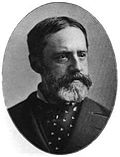| President of Cooper Union | |
|---|---|
 | |
| Appointer | Cooper Union Board of Trustees |
| Formation | 1859 |
| First holder | Peter Cooper |
| Website | Office of the President |
The president of Cooper Union is the chief administrator of Cooper Union.
| President of Cooper Union | |
|---|---|
 | |
| Appointer | Cooper Union Board of Trustees |
| Formation | 1859 |
| First holder | Peter Cooper |
| Website | Office of the President |
The president of Cooper Union is the chief administrator of Cooper Union.
The Cooper Union for the Advancement of Science and Art was founded in 1859 by industrialist, inventor and philanthropist Peter Cooper. From its inception, the college committed to providing full scholarships, regardless of need, to its students. [1]
The following persons have served as president of the Cooper Union: [2]
| No. | Image | President | Term start | Term end | Ref. |
|---|---|---|---|---|---|
| 1 |  | Peter Cooper | 1859 | 1882 | [3] |
| 2 |  | Edward Cooper | 1882 | 1904 | |
| 3 |  | John Edward Parsons | 1905 | 1914 | |
| 4 | Robert Fulton Cutting | 1914 | September 21, 1934 [a] | [4] | |
| 5 | Gano Dunn | February 1, 1935 | June 30, 1951 | [5] [6] | |
| 6 | Edwin S. Burdell | July 1, 1951 | February 28, 1960 [b] | [7] [6] | |
| acting | Johnson E. Fairchild | March 1, 1960 | May 31, 1961 | [7] | |
| 7 | Richard Franklin Humphreys | June 1, 1961 | August 8, 1968 [a] | [8] [9] [10] | |
| acting | Henry Heald | August 9, 1968 | May 31, 1969 | [11] | |
| 8 | John F. White | June 1, 1969 | 1980 | [11] [12] | |
| 9 | Bill N. Lacy | 1980 | 1987 | [13] [14] | |
| 10 | John Jay Iselin | July 1, 1988 | June 30, 2000 | [15] | |
| 11 | | George Campbell Jr. | July 1, 2000 | June 30, 2011 | [16] [17] |
| 12 | Jamshed Bharucha | July 1, 2011 | June 30, 2015 | [1] [18] | |
| acting | William Mea | July 1, 2015 | January 3, 2017 | [19] | |
| 13 | Laura Sparks | January 4, 2017 | August 2024 [c] | [20] [21] [22] [23] | |
| acting | Malcolm King | August 2024 | June 30, 2025 | [24] | |
| 14 | Steven W. McLaughlin | July 1, 2025 | present | [25] | |
Table notes: